
Most people notice that their car surges at idle when the car AC is turned ON, and at the end, the engine shuts OFF. It happens due to many reasons, but it is preferred to know the reasons why the car shuts off when the AC is turned ON.
If your vehicle shuts off when you turn on the A/C, you’re not alone. Many car owners have experienced this problem and have had to take their car to a mechanic to get it fixed. This is a frustrating experience, especially on a hot day. There are a few reasons why this might happen. In this powerful guide, you will learn seven reasons why the car turns off when the AC is activated.
Related Post: How Car Air Conditioner Works
What is the Air Conditioning System in a Car
The ac unit of a car is composed of several interrelated components that allow the vehicle to regulate its climate control. It typically includes an evaporator, condenser, compressor, and expansion valve, as well as other related elements such as accumulators and blower fans. The evaporator works to cool the air inside the car by extracting heat from it and converting it into liquid form, while the condenser is responsible for dissipating this heat away from the cabin same as the condensing unit of your home ac.
Car Shuts OFF When AC Is Turned ON

Many car owners notice when they turn ON the air conditioner, the engine starts to hesitate or shake or we can say vibrate, and sometimes the car stops (which means the engine would shut off). This is a very common problem while using the ac.
The car shuts off when the AC is turned ON, which means that the pressure on the engine is high and the power produced by the engine is low.
As you know, A/C is a huge energy sucker. It consumes a lot of energy when it is turned ON and on the other hand, if the engine can not produce more energy, then the engine will jerk/hesitate and finally will die OFF due to load on your engine. The engine compensates for the lack of power through an idle air control valve mechanism to increase its power and speed.
The car manufacturer introduces the valve “Idle air control valve” in a manually operated throttle body to compensate for power. But, the important question is what is the meaning of idle? Here is the definition of the term “Idle”.
Engine Idling
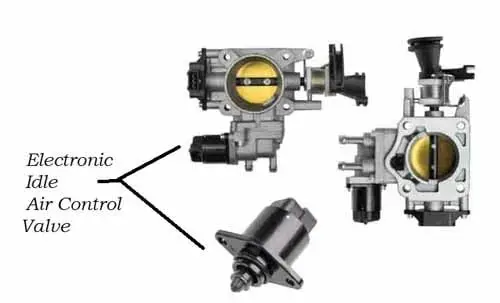
When the engine is running and the car is not moving, we call it the engine in Idle Mode. Normally the car’s Idle RPM is from 600 to 1000 Rev/min depending upon the car and outside temperature. At this Rev/min, the engine produces enough amount of power to stand smoothly without stalling.
Whenever extra work is taken from the engine like when you turn ON the lights or turn the AC ON, it sucks a lot of power and the engine can not produce more power at the same RPM. It must increase its Rev/min to generate more power and stand smoothly.
According to the research, the Air Conditioner causes about a 30-40% average decrease in driving range in Hybrid Electric vehicles.
Now come to the “Idle air control valve (IAC)”. This valve increases and decreases the air-fuel ratio to regulate engine idle Rev/min. When the A/C is turned ON, the valve opens to flow more air into the engine, increases Its Idle Rev/min, and also produces more power and vice versa. So, when carbon builds on the “Idle Air Control Valve (IAC)”, it will fail to maintain proper idle, and as a result, the car surges, and the car’s engine dies OFF when the load is put.
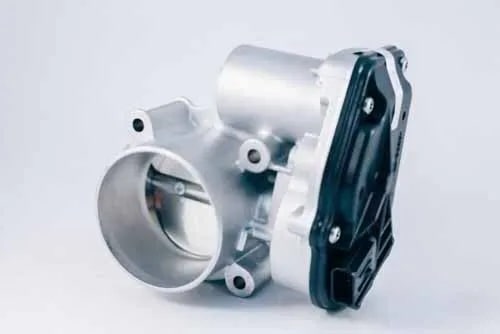
Sometimes a defective “Idle Air Control Valve (IAC)” or “Electronically Controlled Throttle-Body” will send wrong input data to the ECM. The ECM miscalculates the input which leads to a bump in the idle speed and activates the car stumbling.
So, clean the “Idle Air Control Valve (IAC)” and “Electronic Control Throttle-Body” with a soft cleaning cloth dipped in a solvent or do a regular tune-up.
Related Post: 11 Reasons Your Car Air Conditioner Blows Cold Then Warm
7 Reasons Car Stalls When AC Is ON
Below are the seven reasons why the car stalls or turns off when you turn your AC ON.
- Faulty Idle Air Control Valve
- Bad Electronic Controlled Throttle-Body
- Seized Compressor
- Stuck Compressor Pulley
- Worn Belt
- Overfilled With AC Refrigerant
- An Electrical Problem
1. Faulty Idle Air Control Valve
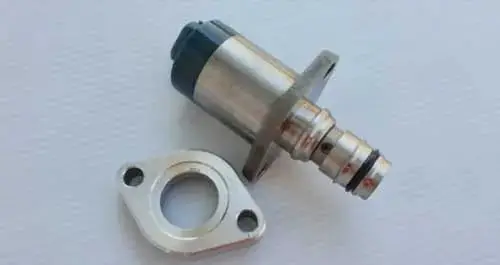
This is one of the most common reasons why your car engine shuts off when AC is turned ON. The IAC valve increases and decreases the engine Rev/min not to shut off the engine when a load is put on the car.
With time the carbon builds up on the idle control valve, through which it cannot perform well which can cause a problem with the AC system. As a result, the engine Rev/min fluctuates up and down and finally, dies off. So, clean the “Idle Air Control Valve (IAC)” with a soft cleaning cloth dipped in a solvent.
2. Bad Electronic Controlled Throttle Body
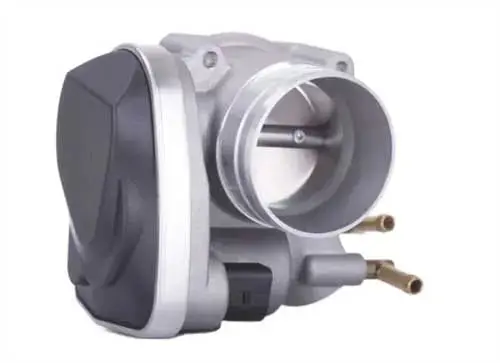
The electronically controlled throttle body is also a common reason why a car will shut down when the A/C is turned ON. Modern vehicles do not have an “Idle Air Control valve”, they have an Electronic Controlled Throttle Body also called Drive by Wire. It takes a signal from ECM.
The same phenomena can happen with Electronic Throttle Control (ETC) Body. If carbon builds on it, It will restrict the passageway for more air to enter, and as a result, the car stumbles. So, you need to check it regularly to clean your car’s electronic throttle control body.
3. Seized Compressor
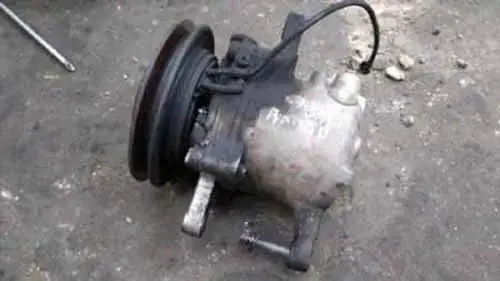
The compressor is an expensive reason for a car to die off the engine when A/C is turned ON. The compressor is running to compress the cooling gas by increasing its pressure and temperature. The seized A/C compressor causes the car to stop.
The compressor might squeeze the refrigerant under high pressure and uses a power of almost 5 to 10 horsepower. It is enough amount of energy to drop down the Rev/min.
Sometimes, your compressor has a problem due to a jammed bearing, which takes too much effort to rotate against the belt causing surges, and finally, the car dies off. You have no option other than to replace the compressor.
Related Post: 7 Basic Parts of Car AC System (With Pics) & Their Functions
4. Stuck Compressor Pulley
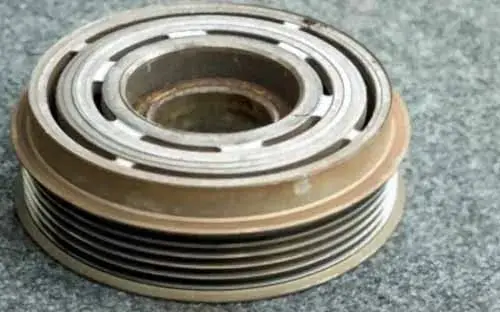
Often, a compressor is in good condition but its pulley bearing is stuck. This stuck pulley bearing drags against the belt and becomes very stiff to rotate the compressor. Under such conditions, ac consumes a lot of energy from the power produced by your engine. As you push the pedal throttle plate will not provide enough energy and put too much strain on the engine, due to which the car starts jerking and stalling.
Related Post: How To Fix Car AC Compressor Clutch Not Engaging
5. A Worn Belt

The drive belt rotates the compressor. When a compressor is turned ON, the engine RPM decreases. A worn drive belt with compressor ON will slip causing a fluctuation in RPM. This increase and decrease in Rev/min are known as car hesitates or hesitations, so turning OFF the car could be due to this reason.
6. Overfilled With AC Refrigerant
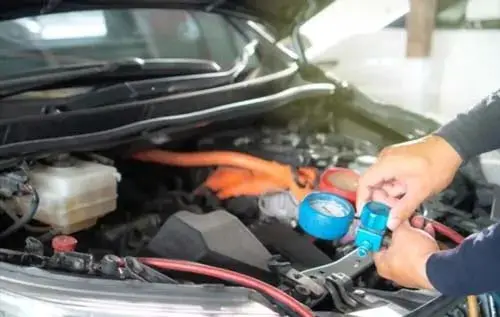
This is another reason for the car dying when A/C is turned ON. The cooling gas in the A/C system should not be high or low in amount. It must be in the right quantity. An A/C system with overfilled cooling gas causes overpressure on the engine means that the load is increased and forces the car to stumble when A/C is turned ON.
Related Post: How To Convert R12 To R134a
7. An Electrical Problem
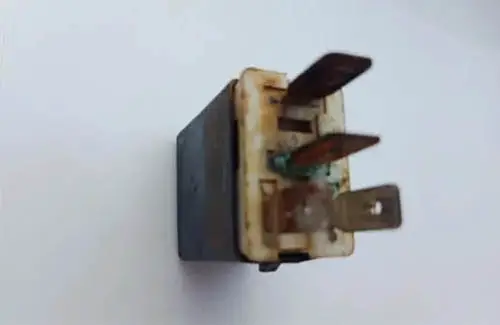
An electrical problem is also the most common reason a car turns off when the AC is activated. Often the car hesitates due to electrical problems like sensor issues. Make sure you don’t have a loose fuse in the fuse box or a corroded relay and immediately replace such a component with a new one from the auto parts store.
Related Post: Car Relay Guide
Symptoms of Car Shutting Off When AC Is Turned On
Several signs indicate a car may shut off when the A/C is turned on.
- Rough Idling: When the engine shakes or vibrates more than usual when the A/C is turned on.
- Strange Noises: Hissing, grinding, or squealing sounds coming from the A/C system.
- Check Engine Light: The warning light may illuminate, indicating a problem with the car’s system.
- Weak Or Uneven Air Flow: Decreased or inconsistent airflow from the A/C system when it’s turned on.
- Decreased Engine Power: The engine may lose power or feel sluggish when the A/C is turned on.
If any of these signs occur, it’s essential to have the car inspected by a qualified technician to diagnose and fix the underlying problem, ensuring safe and smooth driving.
How To Prevent Car Shutting Off When AC Is Turned On
There are several steps you can take to prevent your car from shutting off unexpectedly when you turn on the AC. Here are some tips to keep in mind:
- Regular Maintenance: Schedule routine maintenance checks for your car’s A/C system and engine to ensure that all components are in good working condition.
- Check Refrigerant Level: Make sure the refrigerant level is at the recommended level to prevent the A/C compressor from turning off.
- Clean Air Filters: Dirty air filters can restrict airflow and cause the A/C system to work harder, leading to stalling.
- Check Battery And Alternator: Regularly check the battery and alternator to ensure they are functioning correctly.
- Use Quality Parts: When repairing or replacing components of your A/C system, use high-quality parts to ensure longevity and reliability.
By following these tips, you can prevent your car from turning off unexpectedly when you turn on the AC and ensure safe and smooth driving.
What to Do When Your Car Shuts Off When AC Compressor Is Turned On
Here are some steps presented in a listicle form that you can take when your car dies off unexpectedly after turning on the AC:
- Turn off both the AC and engine to prevent further damage and ensure safety.
- Check the cooling gas level to see if it’s low, which can cause the A/C compressor to die off and the engine to stop.
- Inspect the A/C compressor for any signs of wear and tear or unusual noises.
- Check the battery and alternator for any issues that may be causing a weak power supply to the engine.
- If you’re unsure about how to diagnose the issue, seek the help of a qualified mechanic.
- Regular maintenance of your car’s AC system and the engine can help prevent this issue from happening in the future.
By following these steps, you can stay safe and address the issue promptly when your car dies off unexpectedly after turning on the A/C.
Frequently Asked Questions (FAQs)
The short answer is Yes, The AC compressor affects the engine. The compressor is the heart of the air conditioning system, and it has a direct impact on engine performance. The compressor circulates cooling gas throughout the system, and it helps to cool and pressurize the cooling gas.
The AC compressor is driven by a belt connected to the engine crankshaft. When the A/C is turned on, the compressor puts an extra load on the engine, which can slightly reduce fuel economy and increase emissions. In addition, If the compressor is not operating properly, it can cause the engine to overheat, and it can also affect the performance of the A/C system.
A bad or seized AC compressor can cause a car to stop if the compressor is not functioning properly. This can happen for a variety of reasons, such as if the compressor is not receiving enough power or if the compressor is not properly lubricated. If the compressor is not working properly, it can put a strain on the engine, which can lead to the vehicle shutdown.
If you are receiving hot air this is a sign of a low amount of cooling gas in your vehicle. This might be due to any type of leakage. You need to check your cooling system with a professional to detect the issue.
Sign Up

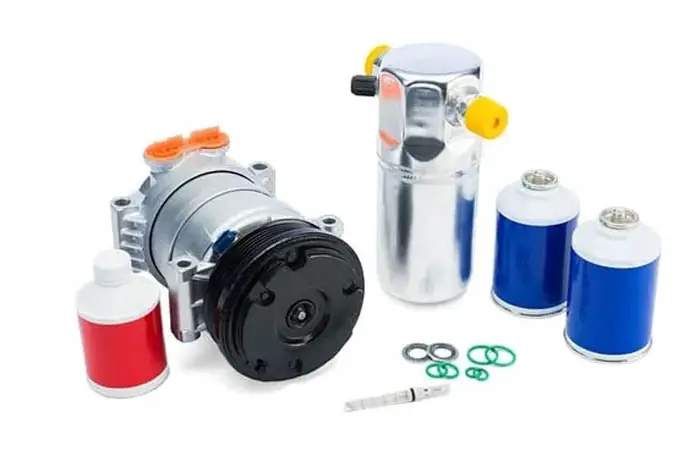



This post was quite interesting and helpful to me
Kwame Leon, My Pleasure!
I will give a trial, thanks.
Got the solution, thanks
Bolbo na: Welcome